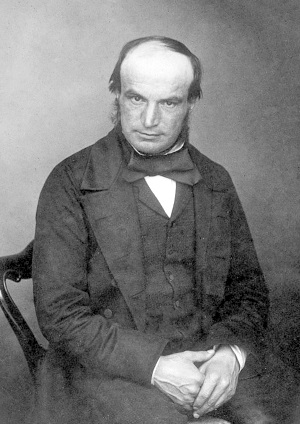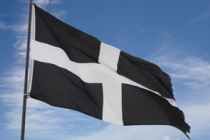John Couch Adams - discovered the planet Neptune, astronomer, mathematical genius

John Counch Adams was born in Laneast, near Launceston, Cornwall on June 5, 1819, and died in Cambridge, England on Jan. 21, 1892 . The Cornish name Couch is pronounced 'cooch'.
His parents were were Tabitha Knill Grylls and Thomas Adams.
The family was a poor one with Thomas being a tenant farmer while Tabitha also came from a farming family. Thomas and Tabitha farmed near Launceston, Cornwall, and it was on Lidcott farm that John, the eldest of his parents seven children, was born. John Couch Adams was named after his mother's uncle, John Couch. It is particularly fitting that this should be the case since John Couch provided some education for Tabitha who inherited his library which included several astronomy books. It was this library, particularly the astronomy books in it, which fired John's interest as he grew up.
Young Adams was educated in local schools before being sent to Cambridge University; this being paid for by inheritance money.
His most famous achievement was predicting the existence and position of Neptune, using only mathematics. The calculations were made to explain discrepancies with Uranus's orbit and the laws of Kepler and Newton. At the same time, but unknown to each other, the same calculations were made by Urbain Le Verrier. Le Verrier would send his coordinates to Berlin Observatory astronomer Johann Gottfried Galle, who confirmed the existence of the planet on 23 September 1846, finding it within 1° of Le Verrier's predicted location .
He was Lowndean Professor in the University of Cambridge from 1859 until his death. He won the Gold Medal of the Royal Astronomical Society in 1866. In 1884, he attended the International Meridian Conference as a delegate for Britain.
Adams made substantial and numerous important contributions to celestial mechanics and received many honours but he remained a Cornishman of humble stock.
So important was Adams work for the world, that his name is commemorated by a crater being named for him on the moon and also a planetoid also named for him, '1996 Adams', a stony asteroid from the inner regions of the asteroid belt, about13 kilometers in diameter. It was discovered on 16 October 1961, at the U.S. Goethe Link Observatory near Brooklyn, Indiana, by the Indiana Asteroid Program.
This article has been kindly provided by Kernow Matters to Us and is the sixth in a series on Famous Folk of Kernow (Cornwall).
- Cornish
- English
- Log in to post comments





